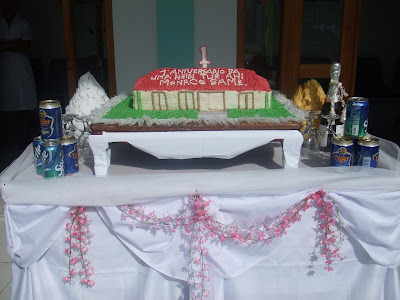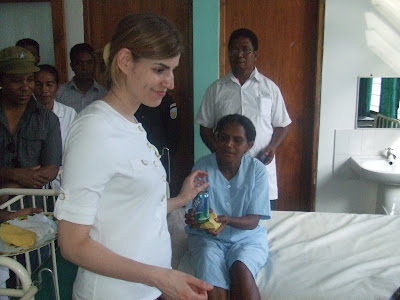
(
Rachael Paulson is shown at her second Green Community Hub with children of Isulabasha Primary in South Africa as they watch the first burst of clean water come from the newly installed water system)MORE THAN JUST WATERRocks, mud, dirt and water erupt from the ground as drill strikes water outside a small school in KwaZulu-Natal, South Africa. Students, faculty and townspeople cry and cheer as they realize that their hopes for easy access to clean water have finally come true.
This is the scene as described by children’s book author turned humanitarian, Rachael Paulson. In a small number of years, Paulson and her organization, Hands on the World Global, have gone from writing children’s books about the environment to actually bringing clean water to impoverished school systems in South Africa. From securing water for schools to building greenhouses to helping orphans, Paulson’s journeys to Africa have gone from one very rocky start to a continuous effort in making the world a better place.
Helping others has been part of Paulson’s life for as long as she can remember. Paulson says she has been trying to make an impact on people’s lives in many ways. First off, she originally pondered becoming a nun in her younger years. “I just remember wanting to be a nun when I was little” says Paulson. “I would pretend to give out communion on the porch where I lived; I just had a giving type of personality. Always saving the ant in the puddle, that kind of thing.”
After straying from that inclination, Paulson then set the aid of children in her sights. Her father was a teacher, and during the summers of her teenage years he would work at Headstart programs in Newark. One aspect of being a part of Headstart is that the teachers were required to make personal visits to their student’s homes. Paulson used to go with her father to what she calls the “scariest areas of the projects” in Newark, into the students’ homes and spending time with the students and their families. Paulson recalls how it just became like a normal thing to her: “It was good because in my years of teaching emotionally disturbed children, nothing shocked me.”
Paulson used this intuition and desire to help others and turned her focus toward the environment. Paulson’s children’s books all have an environmental message: Her books all follow the stories of a young boy named Johnny who learns the lessons of the earth. For her latest book, Sir Johnny’s Recycling Adventure, Paulson didn’t go through a publisher. Instead, she approached wealthy corporations and asked if they would allow her to produce a book on their behalf. Paulson convinced a paper recycling company to sponsor the book, and gave her $60,000 to produce 10,000 copies.
Paulson’s transition from writing children’s books to bringing water to schools in South Africa was a trying one. Her journey started when she was asked by a friend in the United Nations to write a book regarding the importance of water in the environment. In January of 2005, Paulson started doing research for the project. While researching, Paulson became aware of a serious problem in South Africa: there were over 700 schools in the rural region of KwaZulu-Natal without water. True to her humanitarian nature, Paulson says she wanted to know what she could do to help, she wanted to bring water to these schools. She then contacted a water company in South Africa, Umgeni Water, hoping they would support her financially. They agreed, and Paulson then engrossed herself in getting in contact with the heads of schools and learning about the science of actually putting water into the ground.
Unfortunately the water company could not produce the money they had promised her, however after becoming more and more interested Paulson thought of the idea of writing a book while simultaneously raising money for this cause. Paulson contacted a member of Johnson & Johnson, who said that the company could not help her put water in the ground, however if she wanted to go to KwaZulu-Natal and do environmental workshops they would support her. So Paulson took the $9,000 from Johnson & Johnson and ran with it, all the way to South Africa where she wanted to put her plan into action.
Paulson’s first trip to South Africa was not the easiest. For her first time ever touching the continent of Africa, Paulson had to venture to KwaZulu-Natal solo. She had no support from anyone in her personal life, not her husband, friends, collogues—no one. Upon arriving in South Africa and visiting the school, to say she felt intimidated would be an understatement, said Paulson. In the Zulu culture, looking down when someone is speaking to you is a sign of respect—the complete opposite of Paulson’s American cultural instincts. After breaking the ice by “finally getting someone to smile” as Paulson puts it, she started to bond with the students and teachers. After telling her listeners about their options, Paulson said, "you must vote on your choice of pump (I told them,) this is your community not mine".
National Drilling a company who would put the borehole in the ground, came to Paulson's aide, however she and her South African crew waited while a full week passed without reaching water. Paulson had lost 12 pounds from all the stress, she was running on empty--void of both financial funding and hope. She had told the students that maybe she had not come to bring them water, but instead to bring them hope. On her last day there, dressed and ready for the airport, Paulson got a call telling her to come to the school immediately. Upon her arrival she saw people coming down from the hills, students were gathered everywhere anxiously. Paulson had taught them to cheer in English "We want water! We want water!” and this is what she heard stepping out of the car. The children were still chanting at the moment that the drill finally struck water, and Paulson recalls this as one of the happiest moments of her life. "It felt like I just had a baby" she said. Water burst from the ground with mud covering her from head to toe.
In the next few trips that she made to KwaZulu-Natal, Paulson had made some interesting contacts. One young man that Paulson says really touched her heart was a young orphan boy. In South Africa, 1 out of ever 5 children is left orphaned due to the AIDS epidemic. This boy's parents had both passed away from AIDS, and he was left with no one to live with but an aunt who wanted nothing to do with him. Paulson got to know him better, and found out that he was actually walking around on a broken leg. However instead of asking Paulson for medical care, he simply wanted help finding a cane. Paulson says that the boy's selflessness broke her heart, and she went out and got him a new wardrobe and is now in the process of finding him a doctor to fix his leg as a Christmas gift.
Another of Paulson's new friends in KwaZulu-Natal is a man named John. John is a local man who took the initiative to make a huge impact on his community--John has converted his home into an HIV/AIDS support center. John literally sold everything he had to make this conversion possible. He had purchased a small van to take those seeking help to a hospital once a month. John's story also touched Paulson's heart, and Hands on the World Global has just bought John a bus to make transporting patients much easier.
In combination with bringing water to the schools, Paulson also initiated the building of greenhouses. With these self-constructed mini-farms, it allows students, especially the orphans, to plant, cultivate, and eventually harvest their own vegetables and other sustenance, something lacking and hard to come by in KwaZulu-Natal.
Paulson's first trip to South Africa, although she had come to doubt her efforts toward the end, was considered a tremendous success. Through Hands on the World Global, Paulson is striving for bigger grants, bigger projects, and bigger hopes. Day by day support grows and grows for both Paulson and all of her efforts. Rachel Paulson put it best herself by saying "I have a large mission but I am taking it in small steps."
What stated with the small step of one water install has now become an entire sustainability program that is expanding and inspiring health and wellness while helping to meet the United Nations Millennium Goals.
Fortunately, all of these small steps are starting to make big footprints.
Story by Amanda Berrill
....//
Labels: News
.jpg) (The fall of the Wall in Berlin in 1989 by Illustrator Joseph Ayala - courtesy of Author Hertkon)
(The fall of the Wall in Berlin in 1989 by Illustrator Joseph Ayala - courtesy of Author Hertkon) 



























